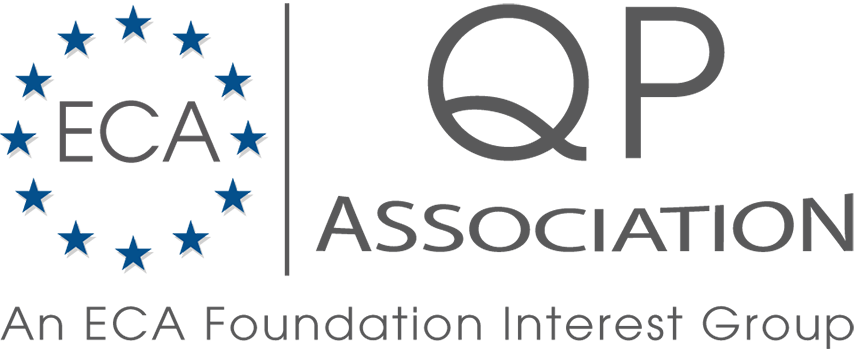European
QP Association's First QP Forum well Received
 From 30 November – 01 December 2006, the
first QP Forum of the new European QP Association was held in Prague,
Czech Republic. 150 Delegates from 26 countries were present – almost
all of them QPs. And all of them came to Prague to be part of the
foundation of the QP Association. From 30 November – 01 December 2006, the
first QP Forum of the new European QP Association was held in Prague,
Czech Republic. 150 Delegates from 26 countries were present – almost
all of them QPs. And all of them came to Prague to be part of the
foundation of the QP Association.
In his preamble as the association's first
chairman, Dr Bernd Renger, Director Quality Control at Vetter
Pharma-Fertigung GmbH, Germany, explained the short but successful
history of the QP Association and its ideas and goals.
Goal of the first meeting was to establish
a platform for sharing experience and discussing the critical areas of
the QP's daily work. Representatives from EMEA and national authorities
as well as QPs were invited to share their view of roles and
responsibilities of the Qualified Person.
David J. Cockburn from the EMEA, U.K., who
felt honoured to give the opening presentation, called the foundation
and the QP Forum a "landmark event", before giving his detailed overview
on the Qualified Person within the European legislative framework. He
presented relevant legislation and guidelines and described in detail
how new and future developments could affect the role and the work of
the Qualified Person.
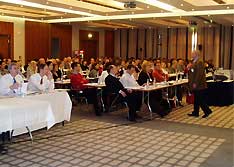 Dr Renger shared his views about batch
releases in the case of OOS results and deviations – a presentation
which led to an interesting and fruitful discussion that also emphasised
the need for better guidance. Dr Renger shared his views about batch
releases in the case of OOS results and deviations – a presentation
which led to an interesting and fruitful discussion that also emphasised
the need for better guidance.
The latest draft of the QP Association
Good Practice Guide was also presented, and more input was requested to
advance it. Richard Bonner completed this part with an overview of the
U.K. Code of Practice.
Richard Bonner, Qualified Person and
formerly with Eli Lilly and Company (U.K.), gave a presentation about
QPs managing the challenge of ensuring GMP-compliant manufacturing of
APIs. Discussions also centred on the need of a QP for API manufacturers
and on how the Qualified Person of the medicinal product manufacturer
can ensure that the API is manufactured in compliance with GMP. Besides
knowing the Quality System, the importance of written contracts, clearly
defined specifications and a sound change control system was pointed
out.
An efficient way on how to audit API
manufacturers by third parties was shown by Dr Thomas Buggy of DSM
Anti-Infectives B.V., Netherlands, and leader of the APIC Third Party
Audit Programme. This programme is getting more and more important to
save resources for both the API manufacturer and the contract giver.
Details are provided in the brochure which can be found at
http://www.apic.cefic.org/publications/publications.html.
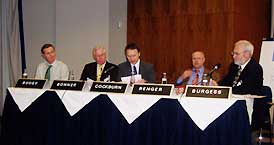 Other discussions involved good storage
and transportation practice and the QP's responsibilities: GMP does not
end at the loading bay. The challenges of the distribution were
presented by John Taylor, MHRA, U.K. Legislation doesn't give detailed
guidance on this important and often underestimated part of the supply
chain. John's lecture comprised expectations as well as a detailed
explanation of the risk areas, the appropriate risk assessment and
recommendations for how to fulfil the requirements best. Other discussions involved good storage
and transportation practice and the QP's responsibilities: GMP does not
end at the loading bay. The challenges of the distribution were
presented by John Taylor, MHRA, U.K. Legislation doesn't give detailed
guidance on this important and often underestimated part of the supply
chain. John's lecture comprised expectations as well as a detailed
explanation of the risk areas, the appropriate risk assessment and
recommendations for how to fulfil the requirements best.
Dr Martin Wesch, a German lawyer
specialised in industrial law, hit a topic which is of high interest for
every Qualified Person: legal actions against QPs – what can happen and
why. Cases of liability and possible sanctions against the QP were
presented and Martin gave valuable recommendations.
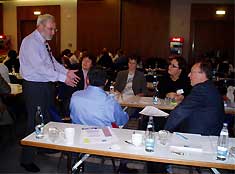 After a set of parallel sessions with
various case studies, Dr Christopher Burgess, QP from the U.K. and an
excellent moderator of this event gave an update on current GMP
guidelines and the latest development. Focussed on the new ICH documents
Q8, Q9, Q10 and recent FDA initiatives, Chris made the delegates aware
of new challenges and chances coming with this new guidance. The
importance of establishing an integrated quality system and the use of
an efficient risk management process were outlined. The presentation was
completed with recent EU GMP updates and an explanation of the new FDA
OOS Guidance for Industry. After a set of parallel sessions with
various case studies, Dr Christopher Burgess, QP from the U.K. and an
excellent moderator of this event gave an update on current GMP
guidelines and the latest development. Focussed on the new ICH documents
Q8, Q9, Q10 and recent FDA initiatives, Chris made the delegates aware
of new challenges and chances coming with this new guidance. The
importance of establishing an integrated quality system and the use of
an efficient risk management process were outlined. The presentation was
completed with recent EU GMP updates and an explanation of the new FDA
OOS Guidance for Industry.
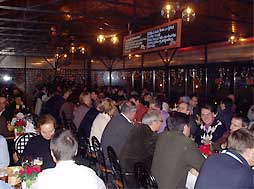 A social event on the evening of the first
day of the QP Forum included a guided city tour and enabled participants
to network and continue their discussions and share their experience
with colleagues from all over Europe in a relaxed atmosphere in a
restaurant in the heart of Prague's old town. A social event on the evening of the first
day of the QP Forum included a guided city tour and enabled participants
to network and continue their discussions and share their experience
with colleagues from all over Europe in a relaxed atmosphere in a
restaurant in the heart of Prague's old town.
In summary, feedback provided clearly
demonstrated that the first QP Forum was well received. The attendees'
involvement as well as the number and quality of questions asked
underlined the importance of the newly formed group. Comments also
clearly showed the need for a regular QP Forum to get the latest
regulatory updates, to discuss interpretations of guidances and
legislation and to learn more about working and acting compliant and
efficient.
Author:
Wolfgang Schmitt
On behalf of the European QP Association
|
